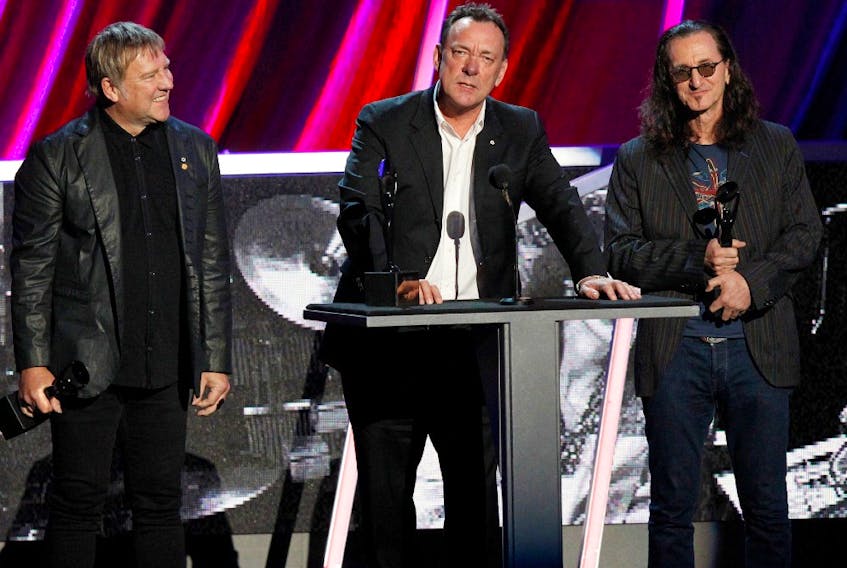I’m not much of a fan-boy. If they held the Grammys in my backyard, I’d draw the curtains. But I have to admit to a lifelong obsession with Canadian rockers Rush that borders on the unhealthy.
I have never understood the outbursts of mass hysteria that have greeted the death of a celebrity that those grieving have never met.
Yet I confess to finding myself moved to tears by the death of drummer Neil Peart, from brain cancer at the age of 67.
To explain — those three mild-mannered Canadians changed my life. I grew up in small-town Scotland, aspiring to own luggage with a YYZ tag on it (the title of a mind-blowing instrumental on the classic Moving Pictures album) or to visit places that had inspired my heroes to write their song Subdivisions — exotically named towns like Mississauga and Etobicoke. It is not an exaggeration to say that when I came to North America to go to graduate school, I ended up in Canada because of Rush.
I was aware of the band in the late 1970s — Spirit of Radio was a Top 20 hit in Britain in 1980, but it was only after I bought the Vital Signs single that I became hooked. The guitar and bass playing were peerless, but it was the drumming and the weirdness of the lyrics that made Rush so different; Peart was the beat and the brains of the band. The dystopian fiction of 2112, inspired by Ayn Rand’s novel Anthem, had an almost hallucinatory impact on a 15-year-old who wasn’t interested in anything unless you could kick it, kiss it or plug it into an amplifier. Neil Peart opened up new worlds.
I wrote to join the Rush fan club in Thornhill, Ont., and found out the band was coming to Edinburgh to promote Moving Pictures. I bought 15 tickets, flogged 14 to my mates at a profit (Rush were huge among the spotty adolescent crowd) and persuaded our geography teacher to drive us in a rented minibus. That night remains etched in my memory to this day: Neil driving complex songs like Tom Sawyer and Red Barchetta from behind this massive kit, with its two bass drums adorned with the starman logo, flanked by a vast backdrop of tubular bells, wind chimes and cowbells.
Listen to Exit Stage Left, the live recording of that tour, and it’s easy to understand why he was consistently voted the best drummer in rock. Such power, such finesse.
I did get to meet Geddy Lee once and he was a perfect gentleman. That brief liaison relieved me of my irrational grudge against my Press Gallery colleague Don Martin, who claimed he was once being made up in the green room at CBC in Toronto when a diffident, long-haired individual approached while he was in the chair.
As Martin recounted: “He said: ‘Excuse me, are you Don Martin?’ He said he was Gerry Lee or something from Rush.” The injustice.
I never did meet The Professor, which may have been just as well. As he wrote in the song Limelight: “I can’t pretend a stranger is a long awaited friend.”
But if he didn’t know me, I felt I knew him through his lyrics and books, which latterly dealt with personal tragedy (the deaths of his daughter and wife) and his attempts to put his life back together (his subsequent re-marriage and the birth of a second daughter in 2009).
Peart called it a day from touring and recording because he was suffering from tendonitis and shoulder problems. He said he’d taken himself out of the game so he didn’t end up like the dancer in his song, Losing It — “Stiff as wire, her lungs on fire/With just the briefest pause/The flooding through her memory/The echoes of old applause.”
But that’s not what I will think of when I think of Neil Peart. I’ll think of great nights in Edinburgh, Glasgow, Toronto and Ottawa watching a master of his craft perform. I’ll think of many more nights with headphones on, playing air drums to Tom Sawyer and Xanadu like a demented extra from the movie I Love You, Man (in which “The Holy Triumvirate” appeared).
And as I reflect on his passing, I’ll think of his own words from the song The Garden.
“The measure of a life is a measure of love and respect/ So hard to earn, so easily burned.”
By any measure, his was a life well lived.
Hail and farewell to a great Canadian.
[email protected]
Twitter.com/IvisonJ
Copyright Postmedia Network Inc., 2020









